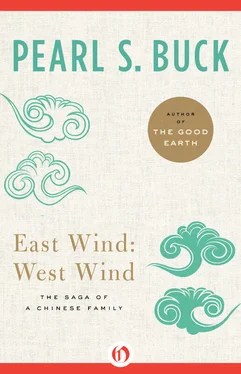“As for you, my child, if my daughter-in-law equals you, I shall not complain over-much. You have been taught to play that ancient harp whose strings have been swept by generations of our women for the delight of their lords. Your fingers are skillful, and your nails are long. You have even been taught the most famous verses of the old poets, and you can sing them sweetly to your harp. I cannot see how even your mother-in-law will find anything lacking in my work. Unless you should bear no son! But I will go to the temple and present the goddess with a gift, should you pass the first year without conception.”
My blood rose to my face. I cannot remember when I did not know of birth and motherhood. The desire for sons in a household like ours, where my father had three concubines whose sole interest was in the conceiving and bearing of children, was too ordinary to contain any mystery. Yet the thought of this for myself — but my mother did not even see my hot cheeks. She sat absorbed in meditation and fell to toying again with the watermelon seeds.
“There is only one thing,” she said finally, “he has been abroad to foreign lands. He has even studied foreign medicines. I do not know — but enough! Time reveals all. You are dismissed.”
I COULD NOT REMEMBER when my mother had spoken so many words, My Sister. Indeed, she seldom spoke, except to correct or to command. This was right, for no one else in our women’s apartments was equal to her, the First Lady, in position or native ability. You have seen my mother, My Sister? She is very thin, you remember, and her face seems carved from ivory for its pallor and its calm. I have heard it said that in her youth before she was wed, she possessed the great beauty of moth eyebrows and lips of the delicacy of the coral-colored buds of the quince tree. Even yet her face, fleshless though it is, preserves the clear oval of the paintings of the ancient women. As for her eyes, the Fourth Lady has a clever tongue, and she said of them once,
“The First Lady’s eyes are sad jewels, black pearls, dying from over-much knowledge of sorrow.”
Ah, my mother!
There was none like her in my childhood. She understood many things and moved with a habitual, quiet dignity which kept the concubines and their children all fearful in her presence. But the servants disliked while they admired her. I used to hear them grumbling because they could not so much as steal the fragments in the kitchen without her discerning the matter. Yet she never reproved them loudly as the concubines did when they were angry. When my mother saw that which did not please her, few words dropped from her lips; but those words were pointed with scorn, and they fell upon the guilty one like sharp ice upon the flesh.
To my brother and to me she was kind, but still formal and undemonstrative, as indeed was proper for one in her position in the family. Of her six children, four were taken in early childhood by the cruelty of the gods, and she therefore valued her only son, my brother. As long as she had given my father one living son he could have no legal ground for complaint against her.
She was, moreover, secretly very proud of her son for his own sake.
You have seen my brother? He is like my mother, thin of body, delicate-boned, tall and straight as a young bamboo tree. As little children we were ever together, and he it was who first taught me to brush the ink over the characters outlined in my primer. But he was a boy and I only a girl, and when he was nine and I six years of age, he was taken out of the women’s apartments into those where my father lived. We seldom met then, for as he grew older he considered it shameful to visit among the women; and moreover, my mother did not encourage it.
I, of course, was never allowed in the courts where the men lived. When first they separated my brother from the women I crept once in the dusk of the evening to the round moon-gate that opened into the men’s apartments; and leaning against the wall opposite it, I peered into the courts beyond, hoping to see my brother perhaps in the garden. But I saw only men-servants, hurrying to and fro with bowls of steaming food. When they opened the doors into my father’s halls, shouts of laughter streamed out, and mingled with it was the thin high singing of a woman’s voice. When the heavy doors shut there was only silence over the garden.
I stood for a long time listening for the laughter of the feasters, wondering wistfully if my brother were then in the midst of the gayety, when suddenly I felt my arm pulled sharply. It was Wang Da Ma, my mother’s chief servant, and she cried,
“Now will I tell your mother if I see this again! Who has ever seen before such an immodest maid to go peeping at the men!”
I dared not speak more than a whispered excuse for shame.
“I sought my brother only.”
But she answered firmly,
“Your brother now is also a man.”
Therefore I seldom saw him again.
But I heard that he loved study and early became proficient in the Four Books and the Five Classics, so that my father at last heeded his beseeching and allowed him to go to a foreign school in Peking. At the time of my marriage he was studying in the National University in Peking, and in his letters home he constantly asked to be allowed to go to America. At first my parents would not hear to such a thing, nor did my mother ever agree to it. But my father disliked trouble, and I could see that in the end my brother might prevail by importuning.
In the two vacations he spent at home before I went away, he spoke much of a book he called “science.” My mother felt this to be unfortunate, for she could see no use for this western knowledge in the life of a Chinese gentleman. The last time he came home he wore the clothes of a foreigner, and my mother was much displeased. When he came into the room, somber and foreign-looking, my mother struck her stick on the floor and cried,
“What is this? What is this? Do not dare to present yourself to me in such an absurd costume!”
He was obliged therefore to put on his own clothes, although he was angry and delayed for two days until my father laughed at him and commanded him. My mother was right. In Chinese clothes my brother appeared stately and a scholar. With his legs exposed in the foreign dress, he resembled nothing seen or heard of in our family.
But even on those two visits he seldom talked with me. I know nothing of the books he loved, for I could not spare the time from the many things necessary to fit me for marriage to pursue further the classics.
Of his own marriage of course we never spoke. It would not have been fitting between a young man and woman. Only I knew through eavesdropping servants that he was rebellious against it and would not marry, although my mother had tried three times to set the wedding date. Each time he had persuaded my father to postpone the matter until he had had further study. And I knew of course that he was betrothed to the second daughter of the house of Li, a family well established in the city in wealth and position. Three generations previous to ours the head of the house of Li and the head of our house ruled as governors in adjoining counties in the same province.
Of course we had not seen his betrothed. The affair had been arranged by my father before my brother was a year old. Therefore it would not have been proper for our families to have any coming and going before my brother’s marriage took place. Indeed, nothing was even spoken concerning the betrothed except once when I heard Wang Da Ma gossiping to the other servants thus,
“It is a pity that the daughter of Li is three years older than our young lord. A husband should be superior even in age. But the family is old and rich and—” Then she saw me and fell silent to her work.
Читать дальше











